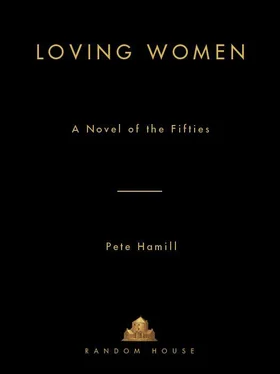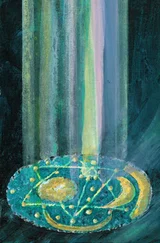Eden , I said, mouth to her ear, sweat of my belly mixed with sweat of hers. I want you forever, Eden .
And she said, No , digging nails into my flesh, No, there’ll be nothing after this , biting my lower lip, saying This is all this is everything there is only this and this and this .
Until we rose and fell and twisted, hissing each other’s names, and dug heels and nails into silk sheets; and fell back.
Empty.
Cool.
Drained.
We ate shrimp and steak from room service and drank a bottle of champagne (my first) and she laughed at the way I held the dainty glass and then she belched loudly for a joke and I laughed too and we didn’t talk, didn’t say what we had to say, didn’t accuse, account, define; and then were in bed again, more desperately than ever, full of loss and departure. I wanted to drink the darkness, the champagne darkness of Eden Santana.
You must go , she said. You must find out. With me you would live only a retreat. My retreat .
Then I was lost again, in some gray and chilly corridor, with the piss-colored fog seeping into my skull, hearing music, Charlie Parker and Gregorian chant, Webb Pierce and Little Richard, bagpipes from the Antrim fields and drums from the Cane River, and I knew what was beyond the fog: the endless cemetery where love was buried.
You must go .
Fear shaped itself in the fog, fear with the same dense volume as desire, fear that could grip me and smother me, and I was afraid then of dying the way love dies, to be placed in some stainless-steel drawer where there was no loving woman. The fog advanced.
You must find out .
And almost dying, I rose in final anger, and grabbed life.
It’s all right, child. Don’t you worry none .
Eden Santana: with a cool cloth to my brow, kissing me, handing over tablet and water, the glass cold in my hand. Gray light leaked through the shutters. I heard the thin distant sound of a saxophone, announcing closing time in a honky-tonk. She eased back into bed beside me and held my hand. Her dark skin felt very cool.
Don’t die , she said. Don’t die on your own. Don’t die of fear or doubt or darkness, child. You got too much living to do yet. You gotta go from here, from me, and remember that the going is the easy part. It’s the living that’s hard. I’ll be with you wherever you go now. You know that, don’t you? But you must go. Not go back. Go on. Put your hair beside the hair of a thousand women. Kiss a thousand mouths. Give them all what we gave each other. Love them all and let them love you back. Then you’ll know I’ll always be there. They won’t know, but you will. Because when it’s over and you have made love and she has got what she wanted and you have got what you wanted, you will still be alone, Michael. Still loving me. As I love you. Wherever we are .
Her voice was a whisper in the dark high-ceilinged room. She was certain: with me she’d finished things. I was no longer what I was the night I first saw her on the bus, and wanted her, and felt her hands in the dark. I wasn’t that boy anymore. But I was still only a perhaps.
So you’ll go from here like a man , she whispered. And you won’t be afraid. Not of the world, not of the Navy. They can’t do anything permanent to you, Michael, no matter how hard they try, just as long as you’re alive. So kiss me one last time now. You gotta go all too soon. Gotta go like a man. Got to go on and live .
I am driving through the Gulf night, the radio playing in its permanent present tense. It is four in the morning. Pensacola is behind me. The news announcer says that the Attorney General of the United States has appeared before still another grand jury. The Challenger space shuttle has been delayed again because of shoddy work. A new strain of AIDS has arrived from Africa. The weather will be hot with scattered showers. Suddenly, the news is over and Frank Sinatra is singing. In the South once ruled by Hank Williams and Webb Pierce.
Each time I see a crowd of people
Just like a fool, I stop and stare
I know it’s not the proper thing to do
But maybe you’ll be there …
The song is old. Out of the fifties. When Sinatra was aching for Ava Gardner and proving that even artists can be fools. I begin to sing along, as if old dead skin is being peeled away, and for the first time in years, I can feel the emotions behind the banal words. The window is open to the warm night. I see houses, shopping centers and factories where there was once only emptiness. And I fill with the woman I loved across all the years, the woman who went with me to all those other beds, and into three marriages, the first and best loving woman among all the women I’ve loved.
I say her name out loud.
And again.
And once more.
Eden.
On this road, years before, Red Cannon took me back to the Navy. I went without struggle. For the first hour out of New Orleans, he drove in silence, the.45 slung to his hip. In Gulfport, I looked out at the pine woods and the little streams and the great stretches of swamp. I felt forlorn. As we turned down to the beach, we could see thunderheads over the ocean. Then Red said, “Need to take a leak?”
“Yeah,” I said. “I do.”
“Figured. Those goddamned malaria pills do it to you.”
He pulled across the highway into a gas station and sat there while I went around the side to the men’s room. For a moment, I thought about running. But I’d given Red my word. And I knew that if I ran, I’d be running for the rest of my life.
When I came out, Red was leaning on the fender of the car, drinking a Coke. His back was to me. He must have known I wouldn’t run. I came around to his side. He was staring out past the beach at the sea. The SP band was off his arm and the cartridge belt and holster were gone from his hip. They were lying on the front seat, the.45 still in the holster. We had become two sailors heading back to base. He drained the Coke bottle and dropped it in a trashcan, still gazing at the Gulf.
“Wish I was out there now,” he said.
I smiled. “Me too.”
Red looked at me for the first time, and shook his head.
“You’ll get there,” he said. “Soon enough.”
“I doubt it,” I said. “Not from where I’m going.”
He curled his lip.
“Where in the hell you think you’re goin , sailor?”
“Portsmouth prison?”
“Shit,” he said, and sneered. “You ain’t important enough for Portsmouth prison.”
He got in behind the wheel and I slid in on the passenger side. He lifted the gun and cartridge belt into the back seat, then started the car and pulled out onto the road. He glanced at me in a disappointed way, as if I were just another one of the people who had failed him.
“You’re lucky, sailor. That jarhead’s okay. Just a busted head, which won’t ever do a Marine no damage. You’re lucky for another thing too: the captain likes you, for some goddamned reason that’s beyond mah ken.”
Someday when all my prayers are answered
I’ll hear a footstep on the stair …
I shut off the radio.
Remembering that Red was right. Pritchett called me before a captain’s mast, which was less than a court martial, allowed me to blame the malaria, restricted me to the base for a week. I shipped out a few weeks later and truly began my long hard run through the world. I don’t know what happened to Red Cannon. I never heard another word about Bobby Bolden. I don’t know what became of Becket or Harrelson or Boswell, Captain Pritchett or Chief McDaid. Max and I wrote to each other for a while, and I saw Sal once when I was on leave in New York. But then the addresses changed, as they do when you’re young, and we moved around some more, and we lost all contact. I started three different letters to Miles Rayfield’s mother, but never could get the words right and gave it up. Out at sea, waiting to go ashore in Cannes, I got one letter from Dixie Shafer saying she was selling the Dirt Bar because it just wasn’t as much fun anymore. I sent a card back, but she too vanished into the darkness. I suppose some of them are dead, casualties of the cigarettes or the whiskey or the Nam. The others live on, full of golden stories.
Читать дальше












